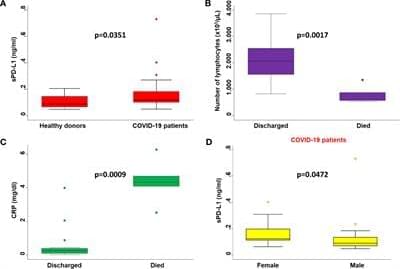Year 2021 
The COVID-19 pandemic has reached direct and indirect medical and social consequences with a subset of patients who rapidly worsen and die from severe-critical manifestations. As a result, there is still an urgent need to identify prognostic biomarkers and effective therapeutic approaches. Severe-critical manifestations of COVID-19 are caused by a dysregulated immune response. Immune checkpoint molecules such as Programmed death-1 (PD-1) and its ligand programmed death-ligand 1 (PD-L1) play an important role in regulating the host immune response and several lines of evidence underly the role of PD-1 modulation in COVID-19. Here, by analyzing blood sample collection from both hospitalized COVID-19 patients and healthy donors, as well as levels of PD-L1 RNA expression in a variety of model systems of SARS-CoV-2, including in vitro tissue cultures, ex-vivo infections of primary epithelial cells and biological samples obtained from tissue biopsies and blood sample collection of COVID-19 and healthy individuals, we demonstrate that serum levels of PD-L1 have a prognostic role in COVID-19 patients and that PD-L1 dysregulation is associated to COVID-19 pathogenesis. Specifically, PD-L1 upregulation is induced by SARS-CoV-2 in infected epithelial cells and is dysregulated in several types of immune cells of COVID-19 patients including monocytes, neutrophils, gamma delta T cells and CD4+ T cells. These results have clinical significance since highlighted the potential role of PD-1/PD-L1 axis in COVID-19, suggest a prognostic role of PD-L1 and provide a further rationale to implement novel clinical studies in COVID-19 patients with PD-1/PD-L1 inhibitors.
COVID-19 pandemic caused by severe acute respiratory syndrome coronavirus-2 (SARS-CoV-2) holds the world in thrall since early March 2020. COVID-19 manifests a spectrum of signs and symptoms from mild illness to acute pneumonia. Unfortunately, a considerable percentage of patients rapidly worse to acute respiratory distress syndrome (ARDS) requiring intensive care (1, 2).
Understanding the link between patients’ immune features and disease severity represents a crucial step in the war against this pandemic. Severe-critical manifestations of COVID-19 are caused by a dysregulated immune response in which the adaptive immune system, ruled by T and B lymphocytes, plays a fundamental role (3).

